Lawrence’s faith-based community is entrenched in helping families and community members when they are down.
| 2018 Q3 | story by Liz Weslander | photos by Steven Hertzog
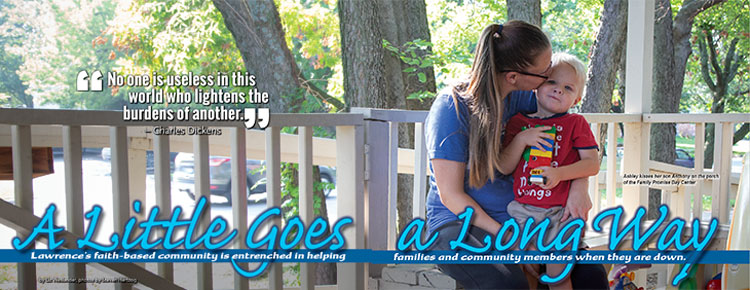
Ashley kisses her son Anthony on the porch of the Family Promise Day Care Center
The value of giving is embedded into nearly every religious tradition. In Lawrence, the positive impact of this commitment to giving is especially visible where churches join together to serve struggling members of the community.
Family Promise of Lawrence and Lawrence Interdenominational Nutrition Kitchen are two local nonprofits that rely on the collaboration of area congregations to provide the lion’s share of time and resources required to fulfill the groups’ missions. Each year, the dedication and cooperation of Lawrence’s faith communities help Family Promise get dozens of homeless families back on their feet, and provide thousands of free meals to people in need at LINK. It’s the kind of synergy that could restore anyone’s faith in humanity.
“Lawrence is a beautiful, generous community,” says Dana Ortiz, executive director of Family Promise of Lawrence. “People really care here, which is pretty special.”
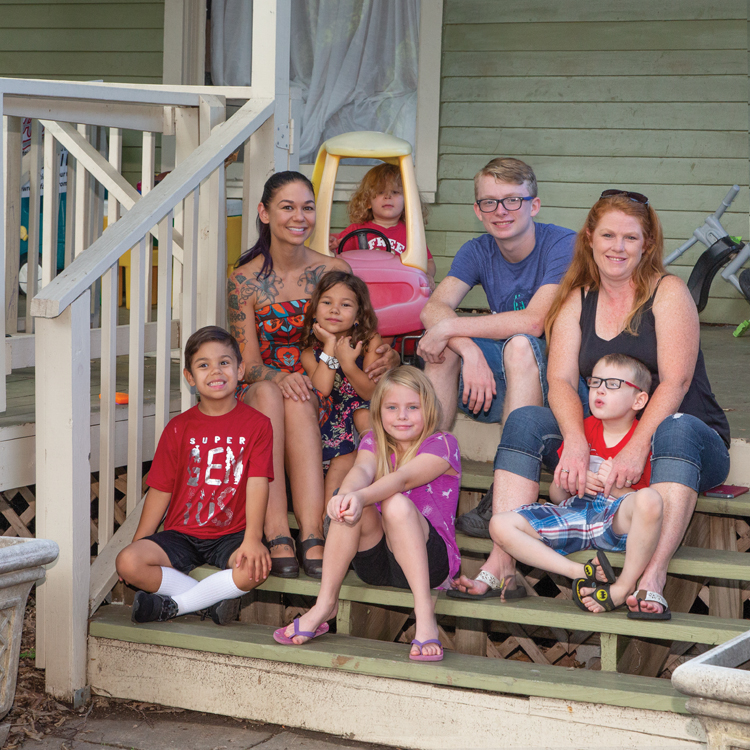
Family Promise Graduate Families
A Promise of Hope
Family Promise of Lawrence’s mission is to help homeless families with children to achieve and maintain permanent housing. The Lawrence branch of Family Promise, which is a national organization with 182 affiliates in 42 states, formed in 2008 after former KU ethics professor Joe Reitz gathered with a group of concerned community members to find ways to address the needs of Lawrence’s under-recognized population of homeless families. Family Promise of Lawrence has four full-time and one part-time paid staff members.
“This is a wonderful organization that allows the local faith communities to walk out their faith—not just speak to it,” Ortiz says. “For those who are willing to serve and get a little bit out of their comfort zone, their faith grows.”
One of Family Promise of Lawrence’s four pillar programs—congregation rotation—provides temporary shelter in local churches for up to four homeless families at one time. Under the congregation rotation, 15 local churches take turns hosting homeless families for a week at a time. As hosts, congregations provide families with comfortable sleeping accommodations, nightly home-cooked dinners and a daily grab-and-go breakfast and lunch. During the day, families leave the host congregation and use Family Promise’s Day Center, at 905 Tennessee St., as a base for their daytime needs and activities. Each hosting week takes about 70 different individuals within a congregation to pull it off, Ortiz explains.
“Hosting is one the neatest, most impactful parts of this program in that it involves so many people in our community,” she continues. “Every night, the families we work with get to meet new people who are volunteering in the congregations whose only requirement is to offer basic human kindness and hospitality. There is no agenda.”
Ortiz says volunteers at hosting congregations are trained to understand that there will be times when families staying with them will have had a rough day and will need their space. But, by sharing home-cooked meals each evening throughout the course of a week, Ortiz says volunteers and families inevitably develop bonds.
“The meal is always a beautiful place for human interactions to take place,” she says. “The dynamic is not just the volunteers serving the families who are homeless, it’s people getting to know other people by gathering together and talking about KU football, or whether we are going to get any rain, or the various sports and arts activities that their kids are participating in.”
Ortiz says Family Promise does not discourage volunteers from inviting families to participate in church activities, but it is never a requirement for families to participate.
“We don’t say, ‘Don’t do anything but serve the meal,’ ” Ortiz says. “There is a human connection taking place, so as things feel appropriate, people we will be invited to participate in whatever is going on that week at the church or will be invited to come back later. A lot of the invitations are to city functions like the movie nights or the sidewalk sale—the things that the rest of us all do.”
Takesha Clark, a local mother of three boys, spent five months in the Family Promise congregation rotation program in 2011 after a house fire left her and her children homeless. Clark found Family Promise through a referral from a counselor at Quail Run Elementary, where her children attended at the time.
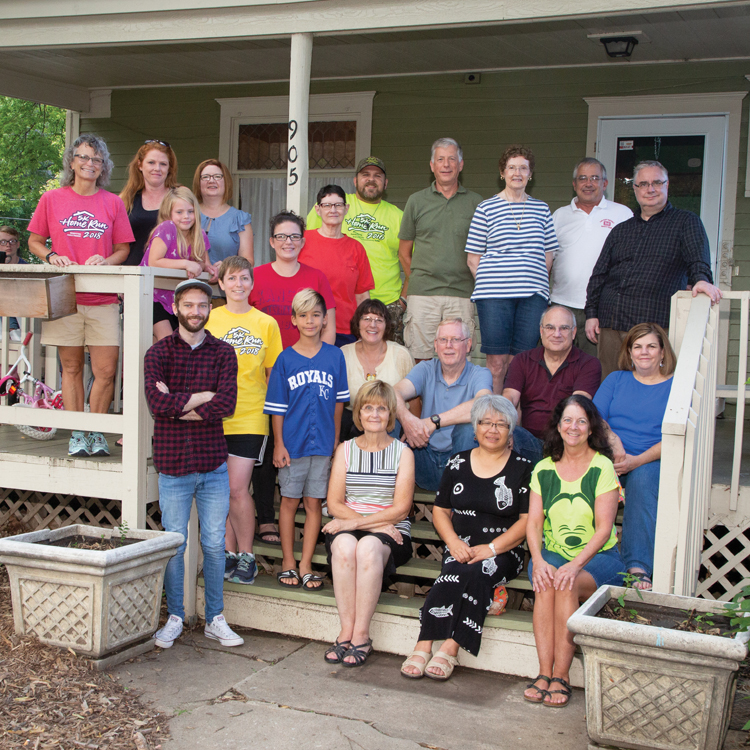
Staff, board members and volunteers for Family Promise of Lawrence
“It was a very humbling experience,” Clark says. “It’s not easy, especially being a mother, when your main priority is that your children are taken care of, and then you can’t even provide shelter for them. With Family Promise, instead of sleeping under a bridge, you have a roof over your head. It’s a program that allows you to continue to work and save up, and your kids are fed every night.”
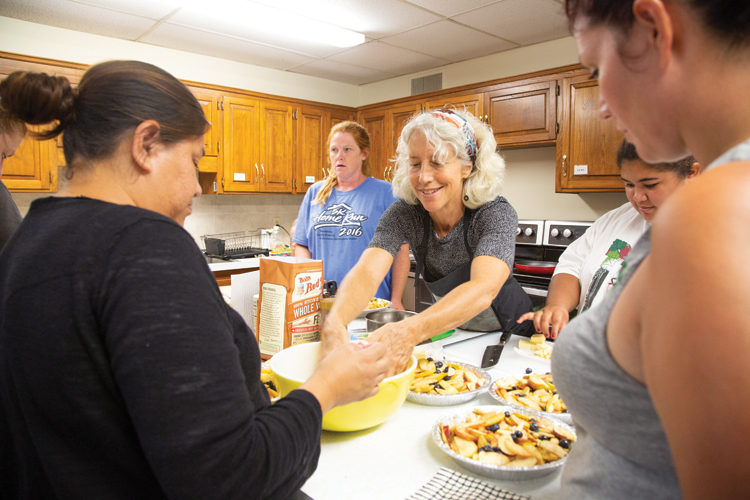
Hilary Kass teaches a healthy cooking class to Family Promise graduates
Clark says that one of the most challenging aspects about experiencing homelessness was trying to maintain a sense of structure and normalcy for the kids under extremely stressful circumstances. During the months when her family was rotating among congregations, Clark describes meticulously organizing her children’s belongings into various containers that she stored in the back of her SUV. When her kids went looking for a football one weekend and left the belongings in disarray, it was enough to send her into a tailspin. Having people to lean on through Family Promise helped her to recover in that moment without putting more stress on the kids.
“It was a Saturday morning at Morningstar Church, and we were about to get ready to go out to the next church,” Clark says. “I had everything so structured in the back of that truck, and it was helping keep me sane. When the kids destroyed it looking for a football, I just collapsed. But, Pastor John picked me up and told me to take a moment while he took the kids. So, I sat in my truck, and I had my moment.”
On average, families stay in the congregation rotation for 49 days, Ortiz says. While some families move directly from the rotation into permanent housing, many move into temporary housing for six to nine months. Family Promise currently has access to six temporary housing buildings, which offer a total of 11 different units.
“The owners of these buildings let us use the properties at a low market rate, very inexpensively,” Ortiz says, “and, we allow a family that qualifies to move in while they continue to work with us and work to build up a savings to hopefully be able to afford housing at the market rate or, alternatively, become eligible for a Section 8 voucher.”
Local churches sponsor three of Family Promise’s temporary housing buildings. Ninth Street Missionary Baptist Church, which owns the building that houses the Family Promise Day Center, also owns a four-unit building directly across from the day center. Trinity Lutheran Church gives use of one of its parsonages for temporary housing, and Lawrence Free Methodist Church sponsors another temporary housing unit.
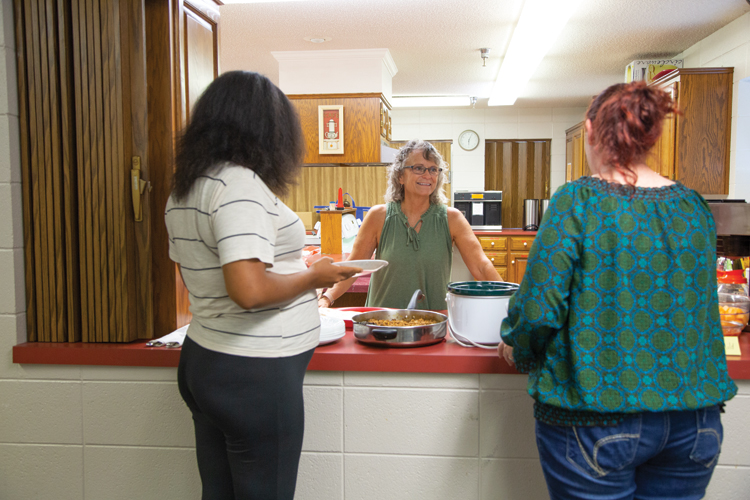
Dana Ortiz, executive director for Family Promise of Lawrence serving dinner to two mothers in their program.
Ortiz says that 86 percent of Family Promise of Lawrence graduates remain in permanent housing. In 2017, Family Promise of Lawrence served 54 unique families experiencing homeless, a total of 175 people. It also served more than 375 individuals through its graduate support programs.
Family Promise has an additional 23 supporting congregations beyond the 15 hosting congregations that donate in various capacities across all of Family Promise’s programs and initiatives. Some examples include doing work projects at temporary housing units and providing dinners for graduate support classes.
“The local communities of faith are involved in all aspects of Family Promise, including financial support,” Ortiz explains. “We could not possibly do what we do without all of our local volunteers but, especially, the faith-based communities.”
Despite its help coming during the lowest period in her life, Clark says Family Promise is one the most positive experiences of her lifetime.
“Family Promise never leaves you,” Clark says. “Once you join, you are part of a family. After I graduated, they continued to call and check on me, they offered support groups. At Christmas, they made sure that we had what needed. When we come into the Day Center to visit, everyone just loves on us. It’s a true community, and they are not going to let you fail.”
Clark’s support for Family Promise goes beyond her kind words. She also serves as the volunteer Family Promise coordinator at her own church, Ninth Street Missionary Baptist Church. The church has been a supporting congregation to Family Promise for several years but recently become a hosting congregation under Clark’s leadership.
“God calls us to be givers,” Clark says. “We can’t pick and choose who we give to, we have to give because it’s in our nature. We are in there getting our hands dirty, working in that vineyard. I love, love, love the Family Promise ministry and encourage other people to get involved.”
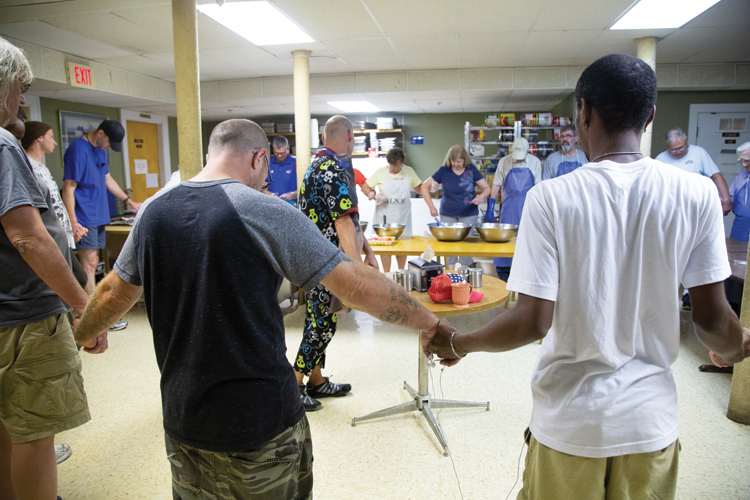
Volunteers serve home cooked meal to LINK participant
Linked by Love
Lawrence Interdenominational Nutrition Kitchen (LINK) is another testament to the positive impact of interfaith organizations in the Lawrence community. LINK has been serving free, hot, home-cooked lunches multiple times a week for the last 33 years. Between 40 and 50 different local faith communities take turns organizing, preparing, serving and cleaning up the lunches, which are open to anyone and occur in the basement of First Christian Church from 1 to 2 p.m. every Tuesday, Thursday, Saturday and Sunday, as well as all federal holidays.
Wendi Meisenheimer, LINK board president, says LINK currently serves about 65 to 75 people at each meal, and a wide a variety of people make use of the free lunches. Some are homeless, some live alone and seek company, and others are individuals and families who have hit a point in the month where the budget is tight.
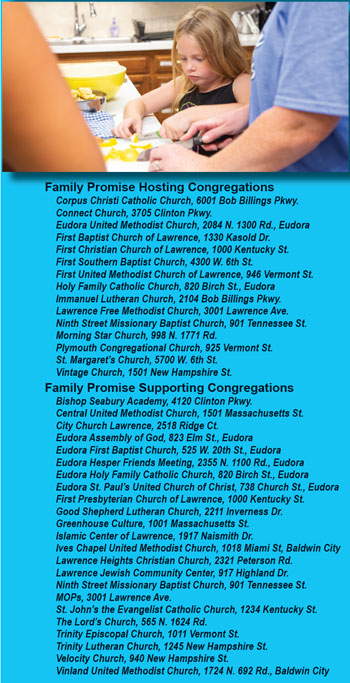
“We are open to everyone—any individual who needs a meal or who might be looking for fellowship—if you walk in the door, you are going to get a meal,” Meisenheimer says. “It’s a place that feels safe. It’s cool in the summer and warm in the winter. We serve all sort of needs.”
LINK is run by a small board of five to seven people and is entirely financed through gifts. Its costs include the rent and utilities on the basement at First Christian Church, the salary of its two paid coordinators and the occasional purchase of supplies such as chairs or an ice machine. Beyond that, LINK runs by the grace of the congregations that donate the food and the personnel for LINK meals.
“The churches are the ones who make it roll,” Meisenheimer says. “Volunteers are the lifeblood of LINK. We would not be in business without them.”
Groups that serve at LINK are responsible for providing 14 casseroles, 10 gallons of milk, as well ample salad, fruits, vegetables and bread. Dessert is highly encouraged. Groups also provide 12 to 14 volunteers who arrive around 11:30 a.m. to prepare the buffet line. Volunteers usually leave around 3 p.m. once the dining room and kitchen are clean.
Meisenheimer explains that finding people who are available to give four hours in the middle of a weekday is one of the most common challenges for LINK. This is why congregations often team up to cover a meal. When LINK occasionally comes up short for labor, Meisenheimer says members are good at getting resourceful.
“Some of the church volunteers who have been doing this for years are starting to age out at 70 or 80 years old; and, in this generation, everyone works, so we do have gaps about once a month,” Meisenheimer says. “But, we will always figure out a way to serve the meal. We will grab some long-term guests to help serve or find some folks who need to fill some community-service hours.”
Like Family Promise, LINK helps meet a pressing community need while providing a structured and meaningful experience for volunteers who are looking to put their faith into action.
“In most church settings, you are called to give back to your community; so giving is something that volunteers already have in their hearts,” Meisenheimer says. “LINK is an opportunity to become more submerged in that act of giving.”
